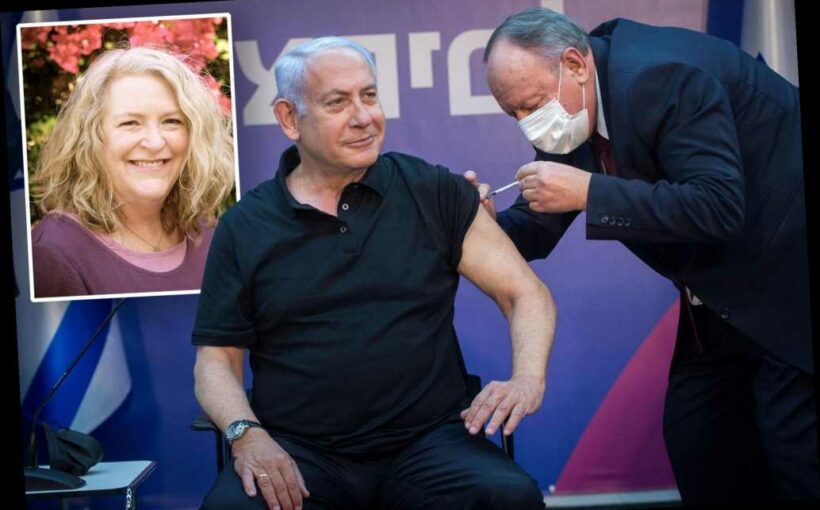More On:
COVID vaccine
Pfizer to ship fewer vials of COVID vaccine to US after extra doses discovered
De Blasio pleads with Biden for quick action on COVID vaccine shortage
‘I gave up’: NYC seniors desperate to get COVID vax rip registration system
Biden’s 1M shots-a-day COVID-19 ‘goal’ was already reached — by Trump
I’m 56 years old, in good health, and not a health-care or essential worker. But on Jan. 2, I received my first dose of the COVID-19 vaccine. I was over the moon with joy — and relief. It took less than 30 minutes to go to the clinic, get my shot, and return home. Thankfully, my life partner, Gidon, who is 85, received his vaccine two days earlier.
Of course, I couldn’t resist posting our vaccination selfies on social media, but an instant later, I felt terribly guilty. At the time, many of my friends and even my elderly parents had no idea when they would receive their vaccinations.
I am an American living in Israel, you see. The country with the most efficient COVID-19 vaccination rollout globally. More than 38 percent of Israel’s population of 9 million is already vaccinated — the highest rate in the world.
By contrast, New York state, with a population of nearly 20 million people, has administered only 1.15 million doses of the vaccine — a mere 5 percent of the population. American health-care and frontline workers are toiling beyond the point of exhaustion, hospitals are full, and only 5 percent of the entire US population has received the first dose.
On Friday, my parents, both 80 years old, drove 45 minutes to the county fairground in rural California where they live and waited in their car, hoping to get a dose. They found out not from their doctor or health insurance but social media that vaccines were available that day. (Only 975 shots for a county of 43,000.) After waiting for more than two hours, the vaccines ran out — and they had to turn back home.
What is wrong with this picture?
The first reason for this disparity is political. In January, Prime Minister Benjamin Netanyahu struck a deal: In exchange for the continued supply of doses, he agreed to make the data collected from Israeli COVID-19 vaccinations available to Pfizer for study. Because of Israel’s highly advanced databases of health-care information, the country was in a position to offer Pfizer something no one else could: large scale data about efficacy and safety in the real world.
It is doubtful that this would fly with an American population increasingly concerned with data privacy. For Israelis, this is a small price to pay. And for Netanyahu, who faces another election in March 2021, this might just result in votes.
Because Israel’s medical system makes information sharing so easy, I knew where and when to get my vaccination because I received a text message from Maccabi, my health-care provider. When I visit the doctor, my health-care card is swiped. Instantly, my medical history appears, allowing any doctor or specialist to immediately review my records.
My health-care card can also be swiped at almost any drugstore in Israel, enabling me to fill my prescriptions safely and with ease.
Significant cultural differences also help explain Israel’s astounding success. Israelis trust and respect science. This is Start-Up Nation, after all, and Israelis are enthusiastic early adopters. There is no significant anti-vaxxer movement here. Israelis have long been in love with technology and innovation.
Noa Hirsch-Choritz, regional director of Israel’s Terem emergency medical services, told me that a distinctly Israeli attitude of “organized chaos” is also at play. Through hard-won experience, Israelis are very good at acting quickly in a crisis.
“We also think outside of the box,” Hirsch-Choritz said. “We were quickly able to turn over large, unused spaces and use them as vaccination centers, so we didn’t disrupt the normal health-care system.”
The Israeli government paid top dollar when the vaccine became available, costing the state an estimated $315 million. According to Kan, Israel’s public broadcasting corporation, that’s roughly the cost of two days of national lockdown. A price that, in the long run, feels worth it.
I am so grateful to have been vaccinated. I am thankful that my beloved Gidon, a Holocaust survivor who has already endured so much, is safer too. My second vaccination is coming up in a few days, and he just received his. Still, it won’t be until my loved ones in the US get fully vaccinated that I will finally be able to heave a sigh of relief.
A native Californian living in Tel Aviv, Julie Gray is the author of “The True Adventures of Gidon Lev: Rascal. Holocaust Survivor. Optimist.”
Share this article:
Source: Read Full Article


